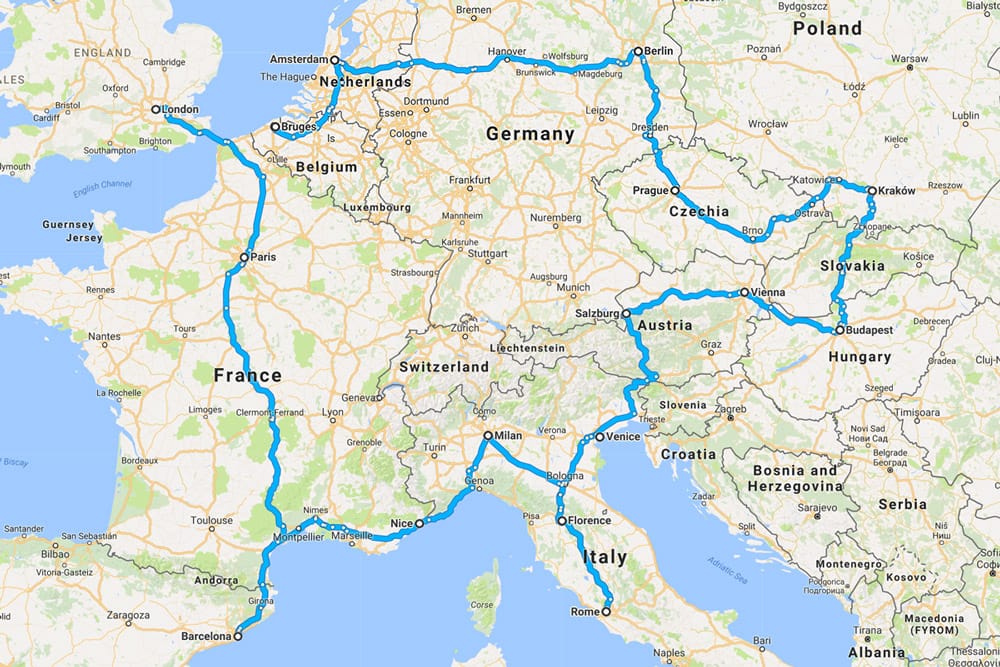Backpacking through Europe is a dream for many, but the thought of expenses can be daunting. However, with careful planning and smart choices, it’s possible to explore this beautiful continent on a budget. From accommodation and transportation to food and sightseeing, here’s a detailed guide on how to make your European backpacking adventure affordable and unforgettable.
1. Plan Your Itinerary Wisely
a. Off-Peak Travel: Consider traveling during the shoulder seasons (spring and fall) to avoid high tourist rates and enjoy pleasant weather.
b. Flexible Dates: Be flexible with your travel dates to take advantage of cheaper flights and accommodations, Kiwi.com is generally the best app for booking the cheapest flights.
c. Choose Affordable Destinations: Eastern European countries like Hungary, Czech Republic, and Poland are generally more budget-friendly than Western European destinations.
2. Transportation

a. Budget Airlines: Utilize budget airlines like Ryanair, EasyJet, and Wizz Air for cheap flights between European cities.
b. Eurail Pass: If you plan to travel extensively by train, consider a Eurail Pass for unlimited train travel within a certain period,
c. Bus Travel: FlixBus and other bus companies offer affordable intercity travel, especially for shorter distances.
d. Ride-Sharing: Use platforms like BlaBlaCar for cost-effective ridesharing options between cities.
e. Walking and Cycling: Explore cities on foot or rent a bike to save on transportation costs and experience the local culture up close.
f. Free Trains: The best way to travel by train in Europe is to book a ticket for the first destination and then stay on for as many stops as you need, you generally wont get stopped and if you do just say your a foreigner and they will usually let you go.
g. Hitchhiking: Hitchhiking in Europe is extremally easy many people will pick you up and even buy you free meals just go to the website hitchwiki.org and enter the city you are in and it will give you a full guide on how to hitch out of there.
3. Accommodation
a. Hostels: Stay in hostels, which are not only economical but also great for meeting fellow travelers.
b. Couchsurfing: Consider Couchsurfing for a free accommodation option, where you stay with locals, couchsurfing.com is generally the best couchsurfing app.
c. Airbnb: Renting a room or apartment through Airbnb can be cheaper than hotels, especially for longer stays, in many of the really cheap countries in Europe you can find beautiful airbnbs for extremally cheap.
d. Camping: If you’re adventurous, camping is an affordable option, with many campsites offering stunning views.
4. Food and Drinks
a. Street Food and Markets: Try local street food and visit markets for fresh, inexpensive meals.
b. Picnics: Have a picnic in parks or scenic spots with food bought from local markets for a budget-friendly meal.
c. Cook Your Own Meals: If you have access to a kitchen, consider cooking your own meals using local ingredients, a big advantage of hostels over hotels is that they will have a public kitchen with pots and pans.
d. Tap Water: In most European countries, tap water is safe to drink, so carry a refillable water bottle to save on buying bottled water.
5. Sightseeing and Activities
a. Free Attractions: Many museums, galleries, and landmarks offer free entry on certain days or during specific hours.
b. City Cards: Purchase city cards that offer discounts or free entry to multiple attractions and public transportation.
c. Walking Tours: Join free walking tours to explore cities and learn about their history from local guides.
d. Outdoor Activities: Opt for outdoor activities like hiking, cycling, or visiting parks, which are often free or have minimal costs.
6. Miscellaneous Tips
a. Travel Light: Pack light to avoid extra baggage fees on budget airlines and to have more flexibility in your travels, never worry about not packing enough clothes you can always buy on the road
b. Student and Youth Discounts: If you’re a student or under 26, take advantage of discounts available for various attractions and transportation.
c. Travel Insurance: While it may seem like an extra cost, travel insurance can save you money in case of emergencies or trip cancellations.
d. Be Flexible: Stay open to changing your plans based on budget constraints or last-minute deals to make the most of your trip.
In conclusion, backpacking through Europe doesn’t have to break the bank. With careful planning, a sense of adventure, and a willingness to embrace local culture, you can experience the beauty and diversity of Europe without emptying your wallet. Follow these tips, and you’ll be well on your way to an affordable and unforgettable European adventure.

